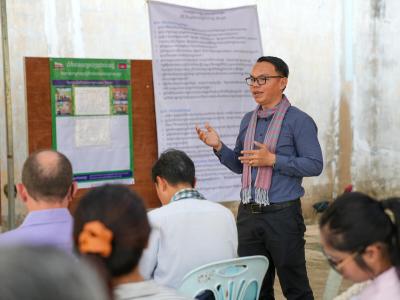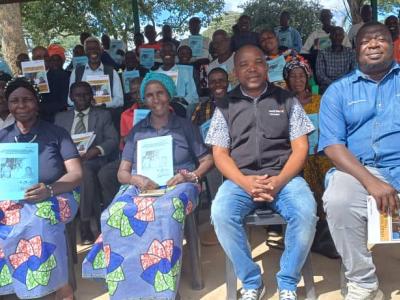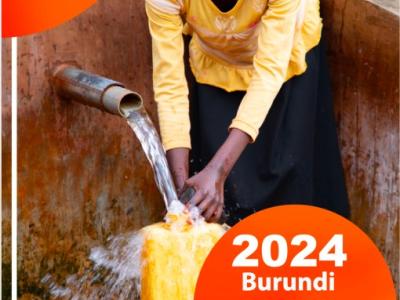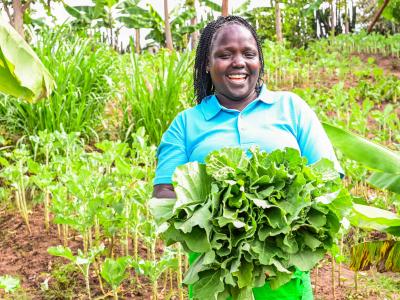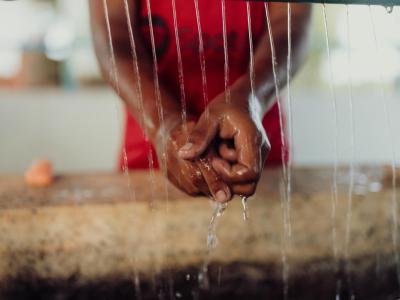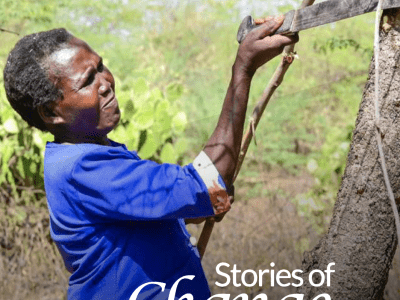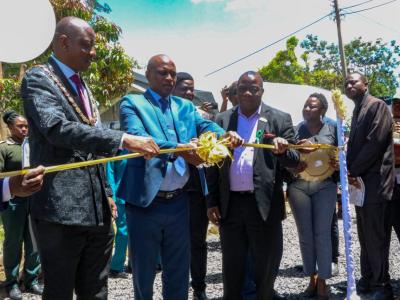publication / April 23, 2025
Regreening Communities Supplementary Guidance Note: Fragile Contexts
World Vision's Regreening Communities Project Model addresses climate change and environmental degradation by guiding communities through a participatory environmental restoration process. A tailored set of solutions is selected by each community including scaling-up indigenous restoration practices, strengthening government partnerships for restoration, and introducing proven practices like Farmer Managed Natural Regeneration (FMNR).
article / April 22, 2025
Social accountability helps farmers tackle climate change
Farmers in Sambour commune, Cambodia, are overcoming climate challenges through improved irrigation and stronger community-government collaboration under the Implementation of Social Accountability Framework project. Investments in dam and canal rehabilitation are helping reduce water costs, protect livelihoods, and boost agricultural resilience.
video / April 23, 2025
Inside Herat: How World Vision Is Supporting Farmers Thrive Again
Climate-related disasters have severely impacted farmers in Herat, Afghanistan — with some, like Naim, losing up to 80% of their harvest.
Watch the video to see how World Vision’s food security and livelihood interventions, supported by improved seeds and fertilisers, are helping families recover and provide nutritious food for their children.
article / April 15, 2025
Empowering Communities Through Citizen Voice and Action: A Path to Better Public Services in Chongwe East Area Programme
His Royal Highness Chief Bunda Bunda of the Soli people has applauded World Vision Zambia's Citizen Voice and Action (CVA) approach for transforming community engagement in Rufunsa District. Recognising the tool’s power to drive accountability and improve essential services, Chief Bunda Bunda hailed CVA as a catalyst for sustainable development in his chiefdom.
publication / April 22, 2025
World Vision Burundi Impact Report 2024
It is with immense pleasure that we present to you our Impact Report for 2024 which covers our work and impact from October 1st, 2023, to September 30th, 2024. Throughout the report, we highlight stories of people who have been positively impacted by your donations, your hard work and your partnership with World Vision.
article / March 27, 2025
From Deforestation to Restoration: How FMNR is Transforming Senetwo Sublocation, West Pokot
Discover how the community in Senetwo Sublocation, Chepareria, West Pokot County, has witnessed remarkable improvements in their environmental and farming practices since the introduction of the Farmer Managed Natural Regeneration (FMNR) approach by World Vision.
press release / April 4, 2025
Banteay Meanchey achieves Open Defecation Free status, transforming public health
A child is washing her hands at a handwashing station.
publication / October 15, 2024
Stories of Change - Central Rift Farmer Managed Natural Regeneration Scale-Up Project (CRIFSUP)
Farmer Managed Natural Regeneration (FMNR) is a sustainable land restoration technique that depends on active management of bushlands, tree stumps and/or seeds that have self-germinated from the soil, allowing them to grow into productive trees. The FMNR approach provides a lowcost, low-risk method for restoration of degraded landscapes while supplying farmers with valuable economic, social and environmental benefits.
This publication records the experiences of participants who have implemented the FMNR approach through World Vision’s CRIFSUP Project.
From their encounters, you will notice how this sustainable low-cost approach has a holistic impact on women, men, children and the community at large.
Additionally, the project trains participants on other complementary components to maximise on benefits achieved from practicing FMNR. These complementary components include: Savings for Transformation (S4T), Citizen Voice and Action (CVA), Local Value Chain Development (LVCD), Empowered Worldview (EWV), energy-saving technologies, soil and water conservation, and Climate-Smart Agriculture (CSA).
article / April 17, 2025
World Vision Calls on Parliament to Place Children at the Center of Mozambique’s Development Agenda
World Vision Mozambique and Parliament renew shared interest to reinforce actions to place children at the top of the agenda as the Assembly of the Republic begins its five-year term.
article / March 14, 2025
A New Era in Public Health Emergency Preparedness and Response in Zimbabwe
Zimbabwe has taken a significant step forward in public health emergency preparedness with the official handover of eight state-of-the-art Public Health Emergency Operations Centres (PHEOCs) by World Vision Zimbabwe to the Ministry of Health and Child Care (MoHCC).

